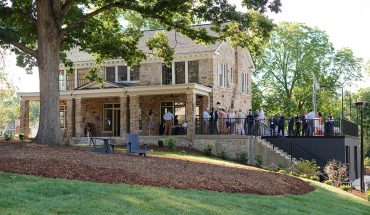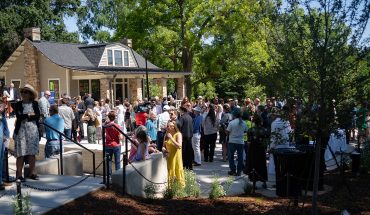A big name in the Dix Park development, this local couple has been quietly donating to charitable causes in Raleigh for decades.
by Lori D. R. Wiggins | photography by Eamon Queeney
The greeting is short and sweet: “I’ve got something to show you,” says Tom Gipson. As I step into the living room of his North Raleigh home, he grabs a remote control and aims it at the television. I sit next to him on the couch; Pat, his wife of 36 years, settles into an armchair at his other side.
A sunflower bursts onto the screen, in full bloom against a clear-blue sky. He explains that it’s the inspiration for a project in the works: a pair of Sunflower Powerline Poles along Lake Wheeler Road. Each of the 73-foot poles will be topped with 48 steel petals up to 10 feet long, signaling the entrance to the forthcoming Gipson Play Plaza, an 18.5-acre public space with a swing terrace, sensory maze, water play mountain and playground, in addition to fountains, gardens and a café, expected to be completed next year.
Gipson hopes the Sunflower Powerline Poles will become “an iconic statement for Raleigh.” The plaza will be named for the Gipsons in honor of the couple’s 2021 gift of $10 million to the Dix Park Conservancy. “We are very excited about Dix Park,” says Tom. “No major city has a piece of land like this available this close to the city center.” This gift could also be considered an iconic statement of the couple’s commitment to reinvesting in Raleigh — and a departure from the quiet nature of their decades of philanthropic efforts.
The Gipsons built their wealth through a mix of hard work, smart investments and modest living. Tom founded Thomas Gipson Homes in 1976 and quickly distinguished himself with a more contemporary building style — cathedral ceilings, lots of glass, open living areas — as an alternative to the traditional two-story home. By the time Tom retired in 2015, the company had built around 1,000 homes in Wake County, mostly in Raleigh and Cary, and was quite successful.
Building on that success, he and his wife have invested all profits into stocks. “I made a fortune in the stock market,” says Tom, noting they leaned toward value-based stocks and invested in “hundreds of them, not just one” over the years. He and Pat also live modestly.
“Our parents went through the Great Depression. They were always frugal — and so were we,” Pat says. They built the house they currently live in back in 1981 and raised their five children there. Each of their kids went to Raleigh public schools.
Tom founded the Gipson Family Foundation in 1979 as “a more effective way to make charitable contributions and keep them separate from personal financial stuff,” he says. Each year, the couple uses their foundation to donate to at least two dozen organizations in Raleigh, including CASA, Communities in Schools, Families Together and Oak City Cares.
“Part of our thinking is that the basis of our wealth is from Raleigh, so we focus our giving on Raleigh-based initiatives,” says Tom. “We want to create more opportunities for people to thrive.” Pat adds: “It matters! It’s one of the reasons we support education so much, too — let’s give everybody a chance.”
That’s the philosophy both she and Tom grew up with, Pat says. “Both of us were raised to believe that if you have something you can give, it’s your obligation as a human to do something to help them,” Pat says.
“I’m not sure anybody knows the extent of Tom and Pat’s philanthropy,” said Carlton Midyette, a longtime friend of the couple. “So much of it is under the radar because, for so long, they’ve avoided the limelight. They have given away millions of dollars, but they’ve done so quietly, in the shadows.”
Alex Holmes, who in 1990 founded Wake County Communities in Schools to help students access the tools they need to stay in school, agrees: “They’re amazing folks; very humble, compassionate about the causes they support, and very creative in how they engage others in supporting their causes.”
There have been some splashier contributions: in 2002, Tom started the Home Builders Blitz program through the Wake County Habitat for Humanity. He challenged 11 other builders to join his company to construct a dozen homes in five days to help give families more affordable housing options. “It’s important to put children in stable housing,” Tom says. “It changes their lives, and the lives of future generations.” The following year, 24 homes were built in Raleigh.
Tom helped expand the weeklong blitzes to Habitat chapters nationwide. In 1988, that work won him The View’s Ultimate Volunteer award, recognizing a person who goes above and beyond to help others. “The impact the Gipsons have had with Habitat for Humanity Wake County is one reason the Wake County affiliate is one of the largest in the country,” says Habitat CEO Patricia Burch.
The Gipsons have had a large philanthropic footprint at the North Carolina Museum of Art, too. There, they’ve introduced to the museum park a wall of pottery and the artwork of Jeppe Hein. Coming soon: two interactive art installations by Montreal design studio Daily tous les jours, called Musical Swings and Daydreamer Benches, that invite people to make music together as they sit or swing on them.
Raleigh’s 10-seat Musical Swings will be only the second permanent installation in the country. “We are thrilled we’re able to get one for the museum,” Tom says.
In addition to investing in Raleigh, the Gipsons have been working to raise their kids “in the spirit of giving,” Tom says. The couple allocates money every year for each of their children “to direct where they think it’s best needed.”
Their son Donald, for example, founded an English-language school in Mexico and invests in an organization that helps build infrastructure in impoverished areas within his community. “I have models who have done amazing things that have impacted thousands of lives,” Donald says. “My parents encouraged all of us to explore the world and find where we can make a difference.”
The Gipsons’ example is “wonderful to watch,” Midyette says. “Tom and Pat have been making Raleigh institutions better for a long time, and they’ve done it largely behind the scenes. Raleigh is lucky to have them.”
This article originally appeared in the August 2023 issue of WALTER magazine.






